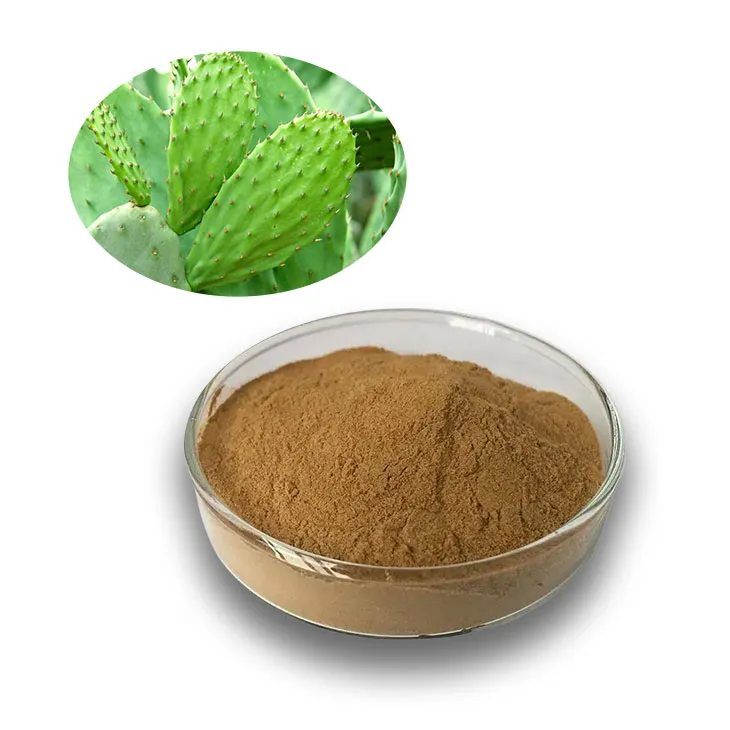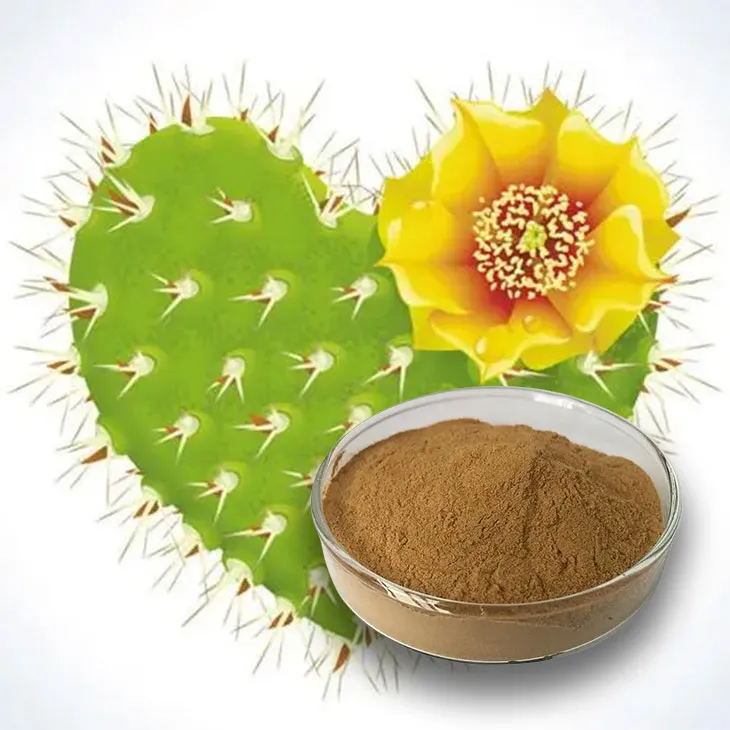- 0086-571-85302990
- sales@greenskybio.com
Active components in cactus extracts.
2024-12-02

1. Introduction
Cactus, a unique and hardy plant, has been used in traditional medicine for centuries. The extract of cactus is rich in a variety of active components, which have shown great potential in many fields such as medicine, cosmetics, and food. These active components endow Cactus Extract with diverse functions, from antioxidant to immunomodulatory, making it a subject of extensive research.

2. Flavonoids in Cactus Extract
Flavonoids are one of the most prominent active ingredients in Cactus Extract. They are a large class of polyphenolic compounds that are widely distributed in plants.
2.1 Antioxidant Properties
Flavonoids in cactus extract possess remarkable antioxidant properties. In the body, free radicals are constantly generated during normal metabolic processes, as well as due to external factors such as pollution and radiation. These free radicals can cause oxidative stress, which in turn can lead to cell damage. Flavonoids can effectively combat free radicals by donating hydrogen atoms or electrons. By neutralizing free radicals, flavonoids help to reduce oxidative stress, thus protecting cells from damage. This antioxidant activity is crucial for maintaining the overall health of the body, as it is associated with the prevention of various diseases, including cardiovascular diseases, cancer, and neurodegenerative disorders.
2.2 Other Health - related Effects
Besides their antioxidant effects, flavonoids in cactus extract may also have other beneficial health effects. For example, some flavonoids have been shown to have anti - inflammatory properties. They can inhibit the production of inflammatory mediators in the body, thereby reducing inflammation. In addition, flavonoids may also play a role in improving vascular function. They can help to relax blood vessels, reduce blood pressure, and improve blood circulation.

3. Polysaccharides in Cactus Extract
Polysaccharides are another important component in cactus extract. These complex carbohydrates are composed of long chains of monosaccharide units.
3.1 Immunomodulatory Effects
One of the most significant features of polysaccharides in cactus extract is their immunomodulatory effects. The immune system is the body's defense mechanism against foreign invaders such as bacteria, viruses, and fungi. Polysaccharides can enhance the function of the immune system in several ways. For example, they can stimulate the production of immune cells such as lymphocytes and macrophages. These immune cells play a crucial role in recognizing and eliminating foreign pathogens. Additionally, polysaccharides can also enhance the activity of immune cells, making them more effective in fighting off diseases.
3.2 Other Biological Activities
In addition to immunomodulatory effects, polysaccharides in cactus extract may also have other biological activities. For example, some polysaccharides have been shown to have anti - tumor properties. They can inhibit the growth and proliferation of tumor cells, either directly or by enhancing the body's immune response against tumors. Moreover, polysaccharides may also have a role in regulating blood sugar levels. They can slow down the absorption of glucose in the intestine, thereby helping to control blood sugar levels in diabetic patients.

4. Alkaloids in Cactus Extract
Alkaloids are also present in cactus extract. Alkaloids are a diverse group of nitrogen - containing organic compounds that are typically alkaline in nature.
4.1 Pharmacological Activities
Alkaloids in cactus extract may have certain pharmacological activities. For example, some alkaloids have been reported to have analgesic effects. They can relieve pain by interacting with pain receptors in the body. In addition, alkaloids may also have anti - inflammatory effects. They can reduce inflammation by inhibiting the production of inflammatory mediators. These pharmacological activities make cactus extract potentially valuable in the development of new drugs for the treatment of pain and inflammation - related diseases.
4.2 Other Potential Effects
Besides analgesic and anti - inflammatory effects, alkaloids in cactus extract may also have other potential effects. For example, some alkaloids may have neuroprotective properties. They can protect neurons from damage, which is important for the prevention and treatment of neurodegenerative diseases such as Alzheimer's and Parkinson's diseases. Moreover, alkaloids may also have a role in regulating the nervous system. They can affect neurotransmitter release and receptor function, thereby influencing the overall function of the nervous system.
5. Other Active Components in Cactus Extract
In addition to flavonoids, polysaccharides, and alkaloids, cactus extract may also contain other active components.
5.1 Sterols
Sterols are a class of lipid - like compounds that are found in cactus extract. Sterols may have several health - related effects. For example, some sterols have been shown to have cholesterol - lowering properties. They can reduce the absorption of cholesterol in the intestine, thereby helping to lower blood cholesterol levels. In addition, sterols may also have anti - inflammatory and antioxidant effects, similar to those of flavonoids.
5.2 Phenolic Acids
Phenolic acids are another group of phenolic compounds that are present in cactus extract. Phenolic acids also possess antioxidant properties. They can scavenge free radicals in the body, thereby reducing oxidative stress. In addition, phenolic acids may also have anti - microbial properties. They can inhibit the growth of bacteria, viruses, and fungi, which is important for maintaining the health of the body.
6. Applications of Cactus Extract
Due to the presence of various active components, cactus extract has a wide range of applications in different fields.
6.1 Medical Applications
In the medical field, cactus extract has great potential. For example, its antioxidant and anti - inflammatory properties make it a candidate for the treatment of various inflammatory diseases such as arthritis. The immunomodulatory effects of cactus extract can be used to enhance the immune system in immunocompromised patients. In addition, the potential analgesic and anti - tumor properties of cactus extract may also be explored for the development of new drugs for pain management and cancer treatment.
6.2 Cosmetic Applications
Cactus extract is also widely used in the cosmetic industry. The antioxidant properties of flavonoids and phenolic acids in cactus extract can help to protect the skin from oxidative damage caused by UV radiation and environmental pollutants. The polysaccharides in cactus extract can moisturize the skin and improve skin elasticity. In addition, the anti - microbial properties of phenolic acids can also be used to prevent skin infections.
6.3 Food Applications
In the food industry, cactus extract can be used as a natural preservative due to its anti - microbial properties. The polysaccharides in cactus extract can also be used as a thickening agent in food products. Moreover, the potential health - promoting effects of cactus extract, such as its antioxidant and immunomodulatory effects, make it a potential functional food ingredient.
7. Conclusion
Cactus extract is rich in a variety of active components, including flavonoids, polysaccharides, alkaloids, sterols, and phenolic acids. These active components endow cactus extract with diverse functions such as antioxidant, immunomodulatory, analgesic, anti - inflammatory, anti - tumor, and cholesterol - lowering properties. Due to these properties, cactus extract has wide - ranging applications in medicine, cosmetics, and food. However, more research is still needed to fully understand the mechanisms of action of these active components and to further explore their potential applications.
FAQ:
What are the main active components in cactus extracts?
The main active components in cactus extracts are flavonoids, polysaccharides and alkaloids. Flavonoids have antioxidant properties. Polysaccharides have immunomodulatory effects. Alkaloids may have analgesic and anti - inflammatory effects.
How do flavonoids in cactus extracts work?
Flavonoids in cactus extracts possess antioxidant properties. They can combat free radicals in the body, thus reducing oxidative stress and preventing cell damage.
What is the role of polysaccharides in cactus extracts?
Polysaccharides in cactus extracts are known for their immunomodulatory effects. They can enhance the body's immune system to better resist diseases.
What are the potential pharmacological activities of alkaloids in cactus extracts?
Alkaloids in cactus extracts may have certain pharmacological activities, such as analgesic and anti - inflammatory effects.
Why is cactus extract valuable in drug development?
Cactus extract is valuable in drug development because it contains active components like alkaloids which may have analgesic and anti - inflammatory effects, flavonoids with antioxidant properties and polysaccharides with immunomodulatory effects.
Related literature
- Active Components of Cactus and Their Potential Health Benefits"
- "Analysis of Bioactive Compounds in Cactus Extracts"
- "The Role of Cactus Extracts in Medicine: A Review of Active Components"
- ▶ Hesperidin
- ▶ citrus bioflavonoids
- ▶ plant extract
- ▶ lycopene
- ▶ Diosmin
- ▶ Grape seed extract
- ▶ Sea buckthorn Juice Powder
- ▶ Beetroot powder
- ▶ Hops Extract
- ▶ Artichoke Extract
- ▶ Reishi mushroom extract
- ▶ Astaxanthin
- ▶ Green Tea Extract
- ▶ Curcumin Extract
- ▶ Horse Chestnut Extract
- ▶ Other Problems
- ▶ Boswellia Serrata Extract
- ▶ Resveratrol Extract
- ▶ Marigold Extract
- ▶ Grape Leaf Extract
- ▶ blog3
- ▶ blog4
-
The best lemon juice powder in nature.
2024-12-02
-
Organic Vitamin K2 Powder Suppliers
2024-12-02
-
Bulk purchase of L - tyrosine.
2024-12-02
-
Vitamin K2 Manufacturers
2024-12-02
-
100% Pure Natural Rutin.
2024-12-02
-
Chinese Citrus Bioflavonoid Suppliers.
2024-12-02
-
Motherwort Extract
2024-12-02
-
Artichoke Extract
2024-12-02
-
Avocado Extract Powder
2024-12-02
-
Milk Thistle Extract
2024-12-02
-
Dan Shen Root Extract/Salvia Root Extract
2024-12-02
-
Lycopene
2024-12-02
-
Black Pepper Extract
2024-12-02
-
Citrus bioflavonoids
2024-12-02
-
Tongkat Ali Extract
2024-12-02
-
Kupilu Extract
2024-12-02





















